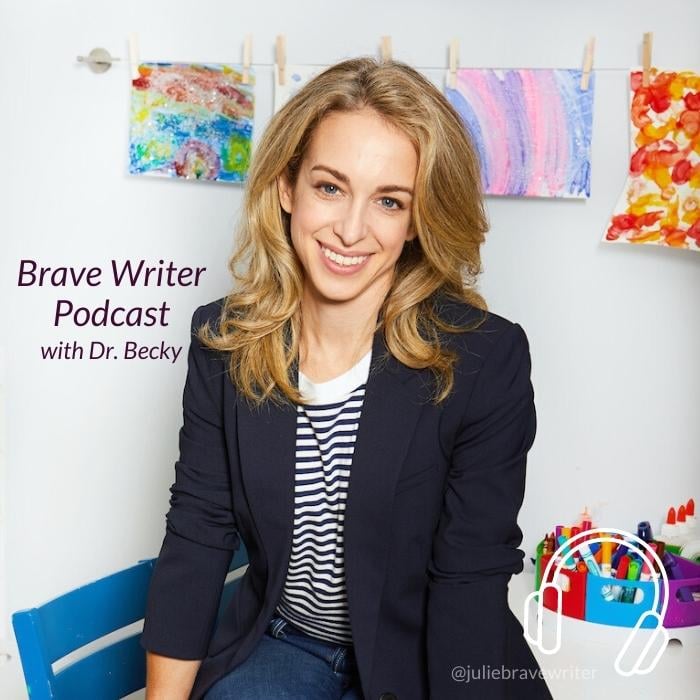Podcast: Raising Kids Who Are Good Inside with Dr. Becky Kennedy

Dr. Becky Kennedy is a clinical psychologist and the founder and CEO of Good Inside, as well as a mom of three, and she’s rethinking the way we raise our kids. Her goal: To empower parents to feel sturdier and more equipped to manage all the challenges every parent faces.
As home educators, we know that you’ve compounded the challenge of parenting by spending every waking moment (and those rare times you’re actually getting some sleep) with your precious ones.
In this Brave Writer podcast, we tackle all the topics from video games to tolerating frustration to thinking through how to deal with a child that expresses a lot of resistance and anger. Dr. Becky Kennedy brings an internal family systems perspective to the job of parenting but offers us so many practical tools. She’s never one to offer advice without breaking down exactly how to implement it in your home.
Show Notes
What does it mean to be “Good Inside”?
We all tend to incorrectly correlate behavior with identity. There are certain behaviors that are just not acceptable, like a child hitting a sibling or lying to their parents’ face—but someone can perform those “bad” behaviors without being “bad” inside. When we approach parenting—and even our own lives—with the belief that people are inherently good inside, we can approach our behavior with a sense of curiosity. Where does the gap between our identity and our behavior come from? And how does that change the way we intervene when undesirable behaviors emerge?
For one thing, it changes the way we view how an action comes to pass. In their hardest moments, children aren’t deciding to act out. Decisions require regulation, control, and forward-thinking—things that no child has in the midst of a difficult situation. As adults, we would rarely decide to yell at our kids, but sometimes it may happen, and that’s with decades of practice and development beyond what our kids have. Kids deserve our compassion when acting out, because it’s something that is beyond their control.
The importance of sturdiness
As a homeschooling parent, you have a lot of responsibility on your plate. You are directly responsible for your child’s education, such as teaching reading, writing, and math. But what do you do when your child says they hate math? That’s where this concept of sturdiness comes in.
Sturdiness is about embodying your authority as a parent. It’s a balance of boundaries and having respect for your child. By being able to create that balance, we are able to answer a vital question our kids have: “Am I safe?”
When kids see that their emotions are out of control—and those feelings are so overwhelming that they cause a parent or teacher to feel out of control—that makes them feel more afraid of those feelings. They start to believe they will never be able to control them. That’s why we set boundaries. And empathy and validation are best friends to boundaries. Because we can keep our boundaries and still let our kids feel as if we are working with them instead of against them.
Creating the right relationship to technology
Technology has changed the way that we think. It’s shortened our ability to focus—or rather, it’s made focusing on anything other than hyper-stimulating activities to be more difficult.
We are building a blueprint of expectations from life at an early age. Part of that is how much challenge we have to tolerate before seeing a reward. One thing technology has done is make it incredibly easy to get satisfaction with minimal effort. When we think about all of the difficult things we have to teach our kids, such as reading, it can take a tremendous amount of effort in order to see some results.
Nothing else is going to be a direct replacement to video games or technology to your kids. We don’t want to trick them into thinking that reading will be just as easy and stimulating as their iPad. But we do have to set boundaries, say no, tolerate their pushback when we have to make that decision, and help them move forward.
Becky wants us to remember that, above all else, parenting is hard. It is objectively too much work for one person, or even two, to take on alone. Have faith in yourself, give yourself grace, and be willing to rest and reset when needed.
Resources
- Learn more at goodinside.com
- Read: “Good Inside”
- Follow Dr. Becky on Instagram: @drbeckyatgoodinside
- Far from the Tree by Andrew Solomon: Prologue
- Brave Writer’s Growing Brave Writers was designed with you in mind, and how to connect with a child to produce writing without pain or trauma. Learn more here: bravewriter.com/products/growing-brave-writers
- Purchase one of our bundles or sign up for a class to be added to our Brave Learner community for free: bravewriter.com/special-offer
- Sign up for Brave Writer’s Text Message Pod Ring: (833) 947-3684 and text the word POD
- Want help getting started with Brave Writer? Head over to bravewriter.com/getting-started
- Sign up for the Brave Writer newsletter to learn about all of the special offers we’re doing in 2022 and you’ll get a free seven-day Writing Blitz guide just for signing up: https://go.bravewriter.com/writing-blitz
Connect with Julie
- Instagram: instagram.com/juliebravewriter
- Twitter: twitter.com/bravewriter
- Facebook: facebook.com/bravewriter


















